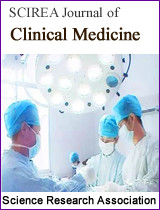“Right step” in severe asthma- immunological monitoring
DOI: 10.54647/cm32725 96 Downloads 15260 Views
Author(s)
Abstract
Severe asthma is often defined as a separate phenotype of asthma. Different combinations of biological molecules are markers in precise diagnosis of asthma. Type of airway inflammation is the main feature of the disease as well as severity is the main goal in treatment. IgE is produced continuously to maintain constant levels in the blood. Many peripheral blood cells express IgE receptors. Efforts to assess regulation of IgE dependent network among patients treated with biologic therapy may contribute to both better understanding of the disease and choosing right therapy option and dosage regimen.
Keywords
severe asthma monitoring, biological treatment, biomarkers, Ig E network; IgE receptors, eosinophils
Cite this paper
Diana M. Hristova,
“Right step” in severe asthma- immunological monitoring
, SCIREA Journal of Clinical Medicine.
Volume 6, Issue 6, December 2021 | PP. 742-749.
10.54647/cm32725
References
| [ 1 ] | Kim et al, Asthma biomarkers in the age of biologics, Allergy Asthma Clin Immunol (2017) 13:48 DOI 10.1186/s13223-017-0219-4 |
| [ 2 ] | Comberiati P, Di Cicco ME, D’Elios S and Peroni DG. How Much Asthma Is Atopic in Children? Front. Pediatr. 5:122. doi: 10.3389/fped.2017.00122 |
| [ 3 ] | T David A. Hill, MD, PhDa,b and Jonathan M. Spergel, MD, PhDa,b, Тhe Atopic March: Critical Evidence and Clinical Relevance, Ann Allergy Asthma Immunol. 2018 February ; 120(2): 131–137. doi:10.1016/j.anai.2017.10.037. |
| [ 4 ] | Chung KF, Wenzel SE, Brozek JL, et al. International ERS/ATS guidelines on definition, evaluation and treatment of severe asthma. Eur Respir J 2014; 43(02): 343–373. |
| [ 5 ] | William W. Busse, Biological treatments for severe asthma: A major advance in asthma care, https://doi.org/10.1016/j.alit.2019.01.004 |
| [ 6 ] | Matucci et al., Is IgE or eosinophils the key player in allergic asthma pathogenesis? Are we asking the right question? Respiratory Research (2018) 19:113 https://doi.org/10.1186/s12931-018-0813-0 |
| [ 7 ] | ChuanghuaQiu1,5, LihongZhong1,5, Chunxiu Huang1, Jia Long1, XuejunYe1,2, JingboWu1, Wenjie Dai 3, Wei Lv4, ChongweiXie3* & Junfang Zhang 1*, Cell-bound IgE and plasma IgE as a combined clinical diagnostic indicator for allergic patients, Scientific Reports | (2020) 10:4700 | https://doi.org/10.1038/s41598-020-61455-8 |
| [ 8 ] | Giuseppe A. Ramirez , 1,2 Mona-Rita Yacoub,1,2 Marco Ripa,1,3 Daniele Mannina,1,4 Adriana Cariddi,1,2 Nicoletta Saporiti,2 Fabio Ciceri,1,4 Antonella Castagna,1,3 Giselda Colombo , 1,2 and Lorenzo Dagna1,2, Eosinophils from Physiology to Disease: A Comprehensive Review, BioMed Research International Volume 2018, Article ID 9095275, 28 pages https://doi.org/10.1155/2018/9095275 |
| [ 9 ] | Todd M. Wilson, DO,a Irina Maric, MD,b Juhi Shukla, MSc,c Margaret Brown, BS,c Carlo Santos, MSc,c Olga Simakova, PhD,c Paneez Khoury, MD,c Michael P. Fay, PhD,d Alexander Kozhich, PhD,e Roland Kolbeck, PhD,e Dean D. Metcalfe, MD,a and Amy D. Klion, MDc, IL-5 receptor a levels in patients with marked eosinophilia or mastocytosis, Clin Immunol 2011;128:1086-92. |
| [ 10 ] | Julia Eckl-Dorna 1 , Sergio Villazala-Merino 1 , Nicholas James Campion 1 , Maria Byazrova 2 , Alexander Filatov 2 , Dmitry Kudlay 2 , Antonina Karsonova 3 , Ksenja Riabova 3 , Musa Khaitov 2 , Alexander Karaulov 3 , Verena Niederberger-Leppin 1 and Rudolf Valenta 2,3,4,*, Tracing IgE-Producing Cells in Allergic Patients, Cells 2019, 8, 994; doi:10.3390/cells8090994 |
| [ 11 ] | Liang and Ganley-Leal, Technical Note: A simple method for measuring human cell-bound IgE levels in whole blood, J Immunol Methods. 2009 April 15; 343(2): 134–139 |
| [ 12 ] | MARKUS F. NEURATH1 , SUSETTA FINOTTO1 & LAURIE H. GLIMCHER2, The role of Th1/Th2 polarization in mucosal immunity, NATURE MEDICINE • VOLUME 8 • NUMBER 6 • JUNE 2002, 2002 |

